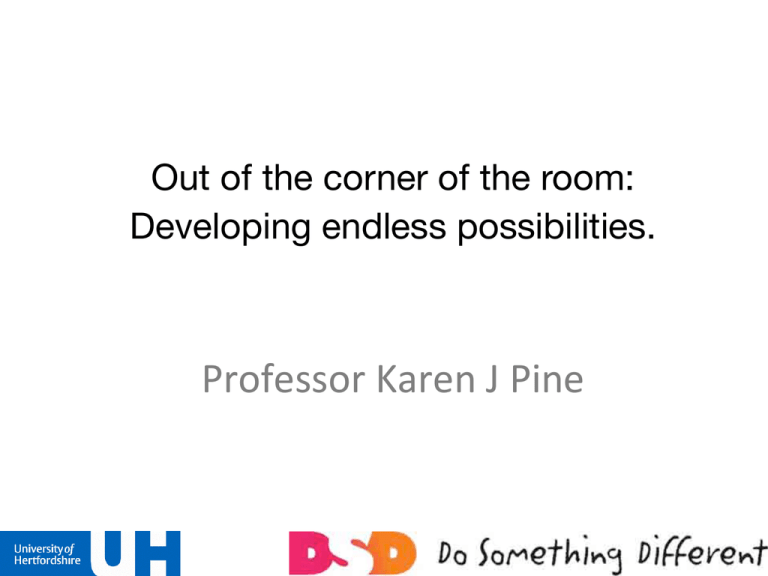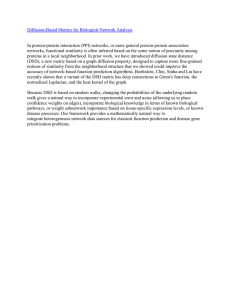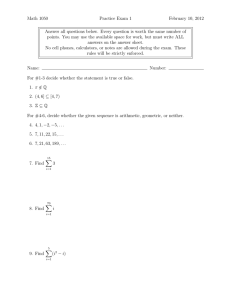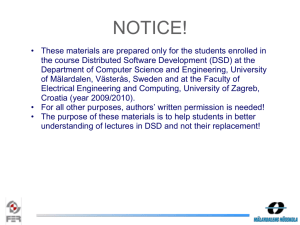Professor Karen J Pine
advertisement

! ! Out of the corner of the room:! Developing endless possibilities. Professor Karen J Pine Do Something Different is changing people’s lives for the be:er. It is all based on research from UH We all like to be prepared but here’s a story about when I was caught unprepared – for a live radio interview and phone-­‐in…… [Radio interview story here] I was forced out of my comfort zone – had to be more flexible and ‘wing it’ -­‐ but it turned out for the be:er. SomeOmes the unplanned things we do, the ones that don’t come naturally to us, bring the most posiOve results….. DSD helps people bring more of those moments into their lives. Alexander Fleming accidentally discovered penicillin aSer returning from holiday to find he’d forgo:en to wash out his Petri dish. Simon Campbell and Dave Roberts were researching a blood pressure drug for Pfizer and found it had unexpected side-­‐effects in men. They had accidentally invented Viagra. Which brings me to my husband…. Ben Fletcher and his PhD student Jill Hanson also had an accidental discovery… which eventually led to the idea of Do Something Different…….they accidentally discovered a link between people’s BMI and their behavioural flexibility. Behavioural Flexibility: • • • • a lack of rigidity open to the new a wide behavioural repertoire acting with intention not! automatically Body Mass Index (BMI) - Weight / height2 Behavioural flexibility and BMI are negatively correlated* *from data with over 1,000 participants Behavioural flexibility scores r = -0.362 p < 0.01 i b tt J v BMI How to increase a person’s behavioural flexibility? • Expand the repertoire of behaviours • Disrupt normal routines • Introduce the ‘new’ • Interrupt habit ‘chains’ • Switch off autopilot and act! with intention with intention rt in sho • Get up half an hour earlier than normal • Read a different magazine or newspaper • Go without the TV for 24 hours • Eat something you’ve never tasted before • Walk a different way back from work/school/a friend’s house • Rearrange some furniture in your home • Draw a self portrait (in any style you like) • Mend something that’s broken • Make conversation with the person who works at your local shop Behave in the opposite way to your personality Why will this help? Do Something Different -­‐ get something different The findings are surprisingly posiOve People look forward to ‘doing something different’ within the first few days – they break down more and more habits. Easy because they enjoy the process ASer a few weeks they start to tackle the habits they want to break -­‐but it doesn’t feel anything like the issue it would have done when they started. ASer a while they begin to do things differently themselves without any prompOng. The mechanism by which it works? DSD EXPANDS BEHAVIOURAL FLEXIBILITY Change in behavioural flexibility and weight loss Fletcher et al., 2008 A.er 28 days of Doing Something Different every day: all 55 par?cipants lost weight. DOSE RELATED – the more people increased their behavioural flexibility the more weight they lost. ALSO – another unexpected finding – their anxiety and depression scores went down. DSD made them less anxious and less depressed too-­‐ changing habits seemed to be criOcal to a range of wellbeing factors. WE WENT ON TO APPLY THIS TO OTHER AREAS E.G. smoking, stress, family funcOoning, relaOonships. WHY BEHAVIOURAL FLEXIBILITY IS IMPORTANT - Having a narrow personality ‘imprisons’ people - Adaptive (adapt to changing environment) - Increases behavioural repertoire (the person has more behaviours with which to face the world ! and can cope with a broader range of ! situations/environments/people) HABITS DRIVE MUCH OF OUR DAILY LIFE. There is a lack of correspondence between our subjecOve experience and what neuroscienOsts knows is actually going on inside our heads. We think we are choosing how to act but we spend a large proportion of our daily lives on auto-pilot. The human brain relegates a lot of higher-level decision-making to the unconscious. Your brain makes a decision before you do. Libet (1985) Tea …..Telly ….. Biscuits The story of how Amy classically conditioned herself to binge on chocolate hobnobs – and how she broke the biscuit habit by cutting out the tea and the telly for a while, and by doing something different instead! Many human actions exist within a chain of habits. One event sets off another. This is true of eating, smoking, anger, all kinds of behaviours Governments may ‘tell’ people to change. There is plenty of health information out there. This is based on the ‘Information deficit hypothesis’: if you give people information they will act in their own best interests. Most don’t. Because if the chain of habits that supports unwanted behaviour isn’t broken, the person fails. The environment cues bad habits and this keeps them in place. It’s important to Do Something Different to break the chain. Our programmes do this, for smoking, family functioning, stress, weight and a range of other behaviours. P L L I W F O H T Y M E TH R E OW Willpower didn’t help Amy – because every Ome she sat on the sofa and watched TV with a cup of tea, she fancied a biscuit (who wouldn’t!). Yet she felt a failure when she broke yet another diet and was fat & unhappy. When she phoned a friend, did some gardening, sorted out her photos instead of watching TV she found she didn’t want a biscuit. And these new behaviours led to new hings happening in her life. Baumeister’s research shows that the use of willpower results in ego-­‐depleOon, it is a limited resource. Like a muscle, we can exercise it for a short while but it quickly Ores. Do Something Different makes change easier. It weakens the chain of habits that support unwanted behaviour. Without the need for willpower. Doing something differently enriches lives, shakes up attitudes and shapes desired behaviour in a fun way. DSD can set off a whole chain of new positive events. Tom’s story How doing something different aSer work helped Tom’s stress and – unexpectedly – improved his relaOonship with his auOsOc son. That helped Tom and Maureen’s marriage and harmony was restored. Just by doing something slightly different. We call this the Law of Unintended Consequences. People constantly tell us of how small changes produced big differences in their lives that they could never have anOcipated. If you do something different then good things might happen as a consequence. If you do nothing…the present will become permanent. More stories on our website www.rilkesroom.com “For if we think of this existence of the individual as a larger or smaller room, it appears evident that most people learn to know only a corner of their room, a place by the window, a strip of floor on which they walk up and down. Thus they have a certain security.” Rainer Maria Rilke 1875-1926 Rainer Maria Rilke (1875 –1926) was a Bohemian-­‐Austrian poet considered by many to be one of the most significant poets in the German language. His poem 'The Fear of the Inexplicable' asks why, if your world was one room, would you only inhabit one corner of that room? In that same vein we ask why would someone only use a fracOon of their potenOal? There is so much for us to explore, so much for us to develop and enjoy, that’s the message behind DSD and the work of Rilke has been a huge inspiraOon to Ben and I. OUR NEW BOOK IS CALLED FLEX: how to use the other 9/10s of your personality Getting what you want from life doesn’t have to involve willpower, denial or deprivation. With Do Something Different change can be FUN too. That’s what motivates people to keep on making changes…… Every programme we run we find a decrease in anxiety and depression. Piano Stairs h:p://www.youtube.com/watch?v=2lXh2n0aPyw Some screen shots from Nixon McInnes, a company who did something different for 6 wks! The staff all had a DSD every day –for example one was to get creaOve and express themselves in a different medium. And their weekend DSD was Cook Something From Scratch, to make sure they didn’t fall back on take-­‐ away habits….. So they cooked and posted photos of what they’d made – “this DSD task was both fun and delicious’ EaOng a piece of fruit very slowly was a DSD designed to stop people from eaOng at their desks without even thinking about what they were doing. Everyday things like eaOng, even the clothes we wear, can become habitual and done mindlessly. (Love Ross’s comment) People tell us they feel changed – as in the quote above. And when we test them before and after a DSD intervention we find they have – for instance, they have usually increased their behavioural flexibility. And they have nearly always reduced their anxiety and depression. Do Something Different increases behavioural flexibility. Flexible people are healthier and happier. PLUS the evidence to date suggests these changes aren’t just transitory, they last. Behavioural flexibility can become a way of life, doing something different is posiOvely reinforcing. Life just gets be:er and be:er! Brain changes? Draganski et al (2004) found structural grey matter (anatomical) brain changes in volunteers who engaged in a new activity. Recently Scholtz et al (2009) also showed changes in white matter. “Experience may shape brain structure….extensive rewiring is possible even in the adult brain.” Johansen-Berg (2007) Centre for Functional fMRI, University of Oxford. We are encouraged by research that shows that the adult brain can change, perhaps DSD can people to lay down new brain pathways?.... We are constantly evaluaOng and researching DSD. One current project is looking at the effects on older adults with mild cogniOve impairment. Companies Thousands of people are doing in-company DSD programmes Self-help books Our books are currently published in FERENT!25 languages world-wide ETHING DIF DO SOM Buy this book and you’ll NEVER have to diet again Stop dieting and start losing weight Out now at all good bookshops Research We have a number of on-going research projects and PhDs www.orionbooks.co.uk Communities Our community programmes are now reaching 50,000 people – and growing www.RilkesRoom.com


